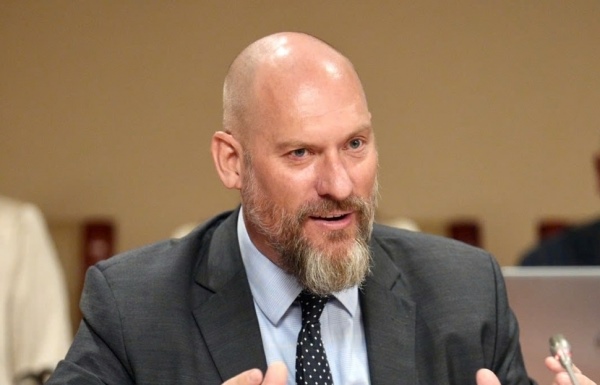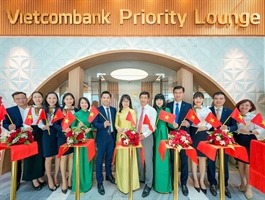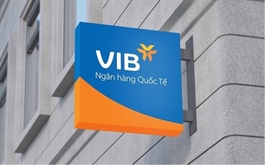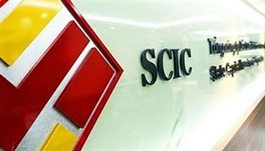Dual model could be path for international financial centre
Dual model could be path for international financial centre
The National Assembly Standing Committee in April reviewed a draft resolution proposing a unified international financial centre in Vietnam, split between Ho Chi Minh City and Danang. VIR’s Bich Ngoc spoke with Richard D. McClellan, founder and principal of RMAC Advisory, about the strategic implications of this dual-location model.
What is your opinion on the dual-location model for Vietnam’s international financial centre (IFC) plans?

Richard D. McClellan, founder and principal of RMAC Advisory, Source tapchitaichinh.vn |
Vietnam’s decision to develop a single IFC with complementary hubs in Ho Chi Minh City and the central city of Danang is both pragmatic and visionary. Rather than competing, the two cities can offer distinct strengths that, when strategically aligned, create a unified yet diversified value proposition for global investors and financial firms.
Ho Chi Minh City should be positioned as the core commercial and capital markets hub. It already houses the headquarters of major banks, insurance companies, and stock exchanges, and has an established business ecosystem, including legal, accounting, and consulting services. This makes it the natural choice for hosting functions such as investment banking, asset management, fintech innovation, and corporate treasury centres.
Danang, by contrast, can offer a more specialised focus. It could be positioned as a green finance, digital finance, or offshore services centre, catering to sustainability-focused investors, digital nomads, or global shared service operations. Danang’s growing tech and education ecosystem, along with its quality of life and regional connectivity, makes it attractive for talent and innovation.
To ensure seamless integration, it will be essential to build a clear governance structure that ties both hubs into one strategic and operational framework. This might include a unified IFC Authority, consistent regulatory policies, shared branding, and digital systems that allow firms to operate across both cities without friction.
Connectivity, both digital and physical, will also be key: fast infrastructure, smart permitting, and harmonised licensing and dispute resolution mechanisms will ensure the two hubs reinforce rather than dilute the national IFC brand.
Should Vietnam’s IFC adopt a common law-based framework?
A modern, investor-friendly legal framework is the foundation of any successful IFC. While adopting full common law may not be feasible across Vietnam’s broader legal system, establishing such a framework within the IFC’s jurisdiction, especially for commercial contracts, dispute resolution, and financial services, would dramatically improve competitiveness.
Global investors value predictability, transparency, and enforceability in financial transactions. IFCs like those found in Dubai and Abu Dhabi have succeeded by creating carve-out legal zones based on English common law, even while operating in civil law countries. Vietnam can learn from these models by building a hybrid approach that protects investor rights, enables international arbitration, and minimises bureaucratic ambiguity.
Digital infrastructure is another critical pillar. A next-generation IFC must be built digital-first, with streamlined e-verification, cloud-based licensing, real-time regulatory reporting, and secure data governance. Financial access, including seamless cross-border capital flows, open banking, and inclusive retail investor participation, is essential for a vibrant financial ecosystem.
Finally, human capital cannot be overlooked. Vietnam has a young and well-educated population, but specialised talent in areas like financial engineering, regulatory compliance, international arbitration, and environmental, social, and governance finance will need to be cultivated. Strategic partnerships with global institutions, targeted educational reforms, and talent visa schemes will be necessary to bridge this gap.
During the establishment of an IFC, what do you consider to be the most significant risks that Vietnam must manage?
The most significant risk is trying to do too much, too fast, without establishing the fundamentals. IFCs are not built overnight – they require a phased, realistic approach grounded in institutional credibility and market confidence.
Regulatory inconsistency or political uncertainty can severely undermine investor trust. Vietnam must ensure that the legal and regulatory reforms underpinning the IFC are insulated from political cycles and bureaucratic fragmentation. A lack of coordination between central and local authorities, or between different ministries, could also slow implementation and send mixed signals to the market.
Another risk is announcing an IFC before the necessary systems are in place. IFCs do not succeed because they are declared, they succeed because investors choose them. Vietnam must avoid creating a symbolic centre without delivering real value and functionality.
There is also the risk of financial imbalances or reputational concerns if regulatory standards are too lax. Vietnam must strike a careful balance between being open and being rigorous, particularly in areas like tax transparency and data security. The IFC must project trustworthiness, not loophole-seeking.
What recommendations would you offer to Vietnam’s policymakers to ensure the long-term success and global competitiveness of the country’s financial centre?
The first aspect is to be clear on the objective: Vietnam’s IFC should not aim to copy Hong Kong or Singapore overnight. Instead, it should focus on “complexifying” the financial ecosystem, broadening access to capital, deepening local markets, and attracting regional financial flows.
If this IFC can help mobilise long-term financing for Vietnam’s development goals, green energy, digital transformation, infrastructure, then it will have fulfilled its highest purpose.
Second is focus on governance and institutional credibility. A well-resourced, autonomous IFC Authority, empowered to coordinate stakeholders, licence entities, and manage international engagement, will be crucial. So too will be international partnerships, including with financial centres like Dubai, Singapore, and London, as well as development institutions like the World Bank and Asian Development Bank.
The third factor is to build in phases. Start with what’s achievable: regulatory reforms to enable foreign financial institutions, pilots in green bonds or digital assets, sandbox mechanisms for fintech, and legal enhancements around dispute resolution. Prove that Vietnam can deliver excellence in these areas, then scale.
Finally, the narrative must be invested in. Vietnam is increasingly seen as a trusted, dynamic, and stable economic partner in a complex world. The IFC should reflect and amplify that brand: a centre not just of finance, but of resilience, innovation, and long-term value creation.
- 08:00 02/05/2025




























